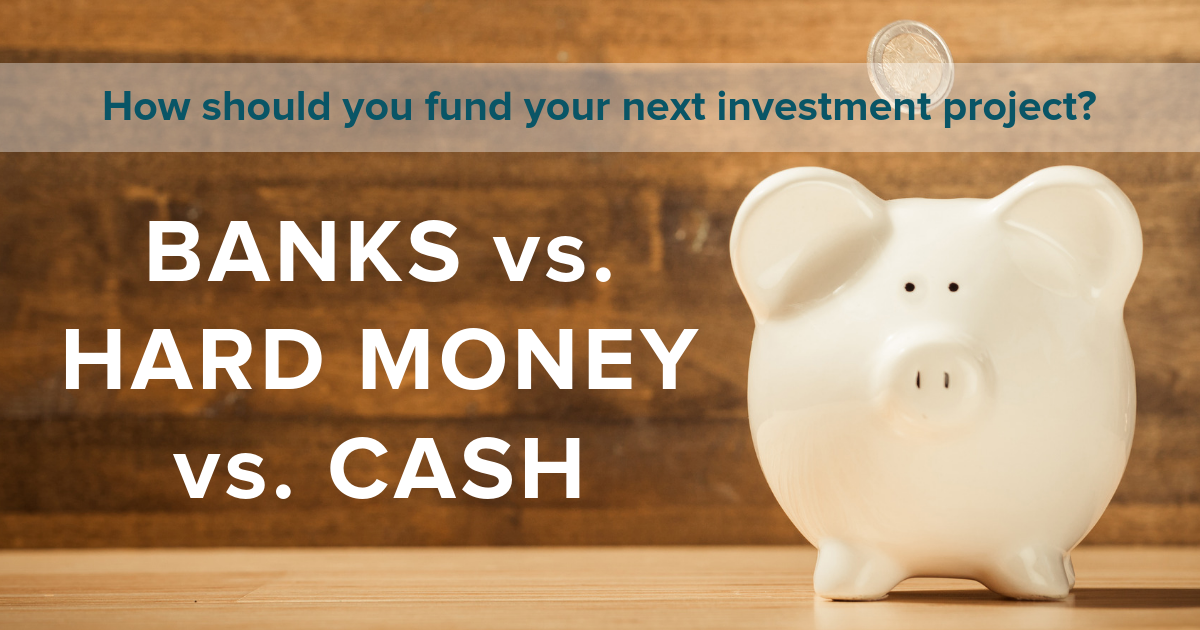With so many options available for real estate loans, it can be hard for investors to decide what type of funding is best for them. Most people think of a traditional mortgage from a bank before anything else, but a conventional loan is not always the best option for an investor – with hard money, investors can get more funding flexibility and take on more, larger, and creative investment projects.
Others assume that cash is king (if they have the resources to purchase and renovate a home without a loan, that is) – but purchasing an investment property with cash can actually reduce an investor’s overall profit and investment potential.
Read on to learn about the pros and cons of the three major funding options for real estate investors and deals– banks, hard money loans, and cash.
Banks
As the most conventional source for real estate loans, banks for real estate investors have a wide variety of financing available for any type of investment. Real estate investment loans typically require higher down payments and interest rates than personal mortgages. However, if you plan on purchasing a multi-unit building and living in one of the units, you can qualify for an FHA loan with as little as 5% down.
Pros:
- Most common investment loans
- Usually lowest available rates
- Leverage cash resources
- Can qualify for FHA loan
Cons:
- Difficult to obtain rehab funds
- Slow closing
- Stringent borrower requirements
- High down payments
Hard Money
For real estate investors, hard money loans are the quickest – and often easiest – way to obtain cash for a project. Hard money lenders base the size of the loan on the property purchase price, the renovation amount, and the after-repair value. Since lenders provide quick cash and increased flexibility for short-term loans, they charge higher interest rates than banks.
Pros:
- Fastest available third party funding
- Specialize in renovation/new construction projects
- Flexible borrower requirements/underwriting
- Leverage cash resources
Cons:
- Higher interest rates
- Down payments vary by lender/deal
- No long-term loans
- No owner-occupied properties
Cash
If you have excess capital languishing in a low-interest savings account, you can put your cash to work by investing in real estate. When using cash, you don’t need to wait for approval from a lender and you can buy the property as soon as you decide to invest. However, depending on how much cash you have available, a cash investment may result in a risky consolidation of your resources.
Pros:
- Immediate deal closing
- No lender fees or interest
- No borrower qualifications
- No limitations on property use
Cons:
- Consolidation of cash resources
- Opportunity cost: lose ability to invest elsewhere
- May lack contingency funds
What type of funding is best for your project?
Fix & Flip
For fix and flip investments, a hard money loan is often the best. The average fix and flip takes just nine months, and experienced investors frequently finish within six months – some investors even consistently pull off one- or two-month flips. Short-term hard money loans close quickly and are easy to obtain, making them ideal for flips. Given the fast-paced nature of the business, having to wait months to secure financing will most likely cause the investor to lose the best deals, and cost them money.
Purchase & Rent
If the seller is willing to wait for you to obtain a conventional loan, borrowing money to invest in property from a bank is your best bet if you don’t intend to perform rehab on the property. Bank loans have the lowest interest rates and are available for long-term investments, ranging from 10 to 30 years. If the deal is time sensitive, you’re better obtaining a hard money loan to fund the purchase (or cash, if you have enough personal resources), then transitioning to a long-term mortgage after the deed is safe in your possession.
Rehab & Rent
Since banks don’t like to fund renovations, investors looking to renovate a rental property should obtain a hard money loan, then transition to a conventional bank mortgage after the rehab is complete. Hard money lenders offer funds based on the potential of the property while banks only offer loans on the current value. Alternatively, you could buy the property with a bank loan and finance the rehab with cash – although, again, the viability of that option depends on your personal financial resources.
There is no one-size-fits-all investment funding option. For different investment strategies, different loans work best. Hard money loans shine in terms of speed, available funding, and flexibility. Banks provide investors with a slow, steady, low-interest mortgage that allows investors to hold a property long-term while investing their personal capital elsewhere. Cash provides the most freedom to investors and the lowest deal costs, but buying investment properties with cash will reduce the potential investment power of the investor’s resources.
If you’re looking for a real estate loan to cover property purchase and/or renovations, ABL has you covered. Our zero-point, high-LTV loan offers financing for 80%-90% of total deal cost.. Call us at 201-942-9089 to learn more about your funding options or fill out our online prequalification form to start your loan process immediately.








0 Comments